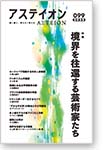
-
Photographic Report
Praying at the Ethiopian Orthodox Church in Tokyoby Itsushi Kawase -
Special Feature: Artists Crossing Borders
Prefaceby Kyo Cho -
Japanese Musicians Active in Europe by Seiji Choki -
Currents of Japonisme
— The Hybridity Seen in Japanese Painters in Franceby Atsushi Miura -
The Shadow Cast on Japanese American Art by World War II by Mai Sato -
Portraits of Japanese Brazilian Artists by Michiko Okano -
Transborder Festivals in the Brazilian Nikkei Community by Sachio Negawa -
The Present State and Future Potential of Literature by “Dekasegi” Nikkei Brazilians by Angelo Ishi -
Diversity in Japanese American Authors by Kaori Mori Want -
What Does It Mean to Cross Borders? by Masashi Miura -
The “Manyoshu” Across Borders A Discussion with
Makoto Ueno,
Peter MacMillan,
and Kyo Cho -
Essay
Fireflies, Grasshoppers, Even Spiders…by Shuji Takashina -
Photographic Report
Images of Death—Sketches, Death Masks, and Bronze Statuesby Ayaka Murashima -
Essays
Transformations in Architectureby Terunobu Fujimori -
The Elevator at Osaka Castle and the Problem of Authenticity by Hiroshi Watanabe -
Articles
Japan, the Ambiguous, and Masks
— COVID-19 Measures and Remains of the Empireby Tomohisa Sumida -
The Development of Western Music Education in Modern Japan
— The Acceptance of Such Concepts as Scale and Harmonyby Maho Nakatsuji -
Correspondence on Current Thought
Gender and Artby Izumi Nakajima -
Advancing Through Creative Integration
— The Present-day Significance of the Mary Parker Follett Theory of Managementby Takuo Ando -
New Developments in Theories of Nationalism by Ryo Nakai -
Essays
Data Journalism Opening Up One’s Experience of the Newsby Kazuki Ogiwara -
Man-Made War and Fictional States by Yu Koizumi -
Serial Project
The Plan to Explore the New Coming Together and Fusions of the Two Cultures
Part 4 (Final). Interdisciplinary, From Challenge to Everydayby Taeko Ando,
Ayako Gotoh,
Satoshi Sakurai,
Gouranga Charan Pradhan,
Soichiro Mitani,
Jun Murata,
and Naoki Miyano -
Essays
The Psychology and Historical Background Behind Clemency Petitionsby Toshiki Koyama -
José Ortega y Gasset’s “The Revolt of the Masses” vs. Harmless and Complacent Masses by Naoyuki Agawa -
Some Thoughts on Global Warming by Naomichi Ishige -
Serials
Revisiting the History of Jiangnan (Southern China)
Part 4. From “Land of Disease” to Revolutionby Takashi Okamoto -
The Beginnings of Entomology
Part 4. The People Who Supported Japanese Entomologyby Daisaburo Okumoto -
Heisei History 6: Toward China’s Rise to Power and a World of US-China Confrontation by Makoto Iokibe
Asteion was launched in 1986, a time when intellectual endeavor was still being held back by competing ideologies. Things have moved on since then. By adopting a more flexible approach and tuning our senses to a broad range of global issues, rather than churning out articles focusing solely on current affairs, we have developed a keen understanding of contemporary trends. The name Asteion comes from the Ancient Greek "ASTEION," meaning sophisticated and refined. This reflects our desire to stimulate intelligent discourse among those who are independent and yet share the same public space as fellow citizens through active but sensible exchanges of diverse opinions. A quarter of a century on, the competing ideologies that marked the twentieth century have now converged, leaving us free to express our opinions on an endless range of subjects. Our mission to promote genuine debate is all the more important for shedding light on the mega-waves of our time. We hope that more and more people, each interested in public issues in their own way, will come to share the spirit of Asteion and support our efforts. Masayuki Tadokoro Chair, Asteion Editorial Committee
![]()
![]()
|
|---|
- Vol.098 A Historical Perspective on the “Chinese Dream”? : The Extent of the Sinosphere in East Asia
- Vol.097 The Ukraine War: A Global Perspective
- Vol.096 Common Sense in Economics, Common Sense in Popular Thought
- Vol.095 Academic Journalism
- Vol.094 Once Again, What Are Today’s Problems?
- Vol.093 A New American Century?
- Vol.092 The “Patchwork” Order Encompassing the World
- Vol.091 The Future as Possibility – Japan in 100 Years
- Vol.090 Redefining the State: 130 Years Since the Meiji Constitution
- Vol.089 The Paradox of Choice of Citizenship
- Vol.088 Special Feature: The End of the Liberal International Order?
- Vol.087 Special Feature: Chinese-Language Literature Beyond China


